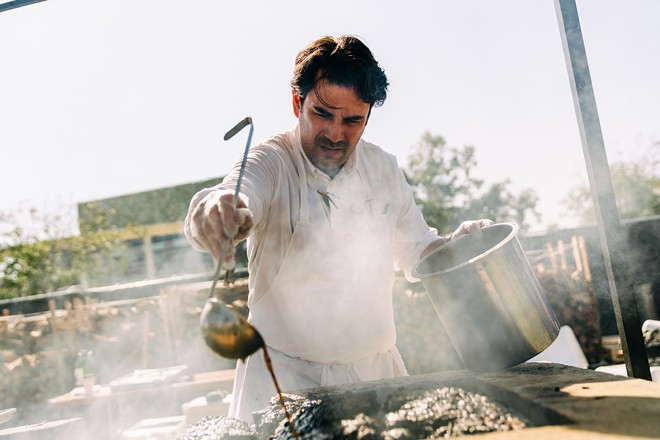
Grilled cheese. Brunch. Mole.
In recent years, it seems like a food festival has percolated up in San Antonio celebrating just about any dish — or cuisine — you can name.
Theoretically, when culinary pros participate in those events, they stand to raise their profiles with foodies, promote their latest ventures and benefit from mingling with others in the industry.
But there's also a downside to the facetime with fans. The events can be high-pressure additions to chefs' already busy schedules, not to mention, they can be money-losing propositions.
For each fest, restaurants are asked to prepare sample bites of signature dishes, which requires a major outlay of time and labor. Beyond prepping the food, chefs often need to bring employees along to help set up, serve and break down. In many cases, restaurant teams aren't compensated for their materials or time.
"The asks are just beginning to be too much. Three-thousand samples is a lot of food, no matter how you slice it," said Terry Koval, a visiting Atlanta chef, at this year's Austin Food & Wine Festival, which took place Nov. 4-6. "It really takes a setup like this, where the organizers make sure [my crew and I] have somewhere to stay, tickets to the whole thing, you know. It takes all of that to make it worth making the trip."
In the end, Koval enlisted the help of San Antonio-area pros to supplement his team for the fest so he could avoid racking up major travel expenses to make the appearance.
Jorge Luis Hernández — the new executive chef for San Antonio's Hotel Emma — also appeared at the Austin Food & Wine Festival. Even though he works for a luxury hotel with multiple culinary destinations, he was the only kitchen employee who made the trip.
"I literally could not have pulled anyone from any of my kitchens to be here today," Hernández said. "I couldn't have spared anyone. If these [volunteer culinary students] weren't here, I'd have been screwed."
Staff shortages
The strain of festival appearances has only increased since the pandemic.
The exodus of foodservice workers during the COVID crisis has required chef-owners to take on even more responsibility for facilitating these events. At the same time, the number of festivals is growing, creating an untenable situation for many.
During the weekend of the Austin Food & Wine festival, area chefs also had to consider whether to participate in Texas Monthly's BBQ Fest in Lockhart, Fredericksburg's Oktoberfest, Brenham's Butchers Ball and CultureMap Austin's The Tailgate.
Nicola Blaque, chef-owner of San Antonio's The Jerk Shack, attended three offsite events that weekend. She appeared at the Butcher's ball, won the Tastemaker Award at The Tailgate for her Caribbean ceviche, then competed against 13 other chefs at Austin Food & Wine's Rock Your Taco event.
Blaque's husband and two kids accompanied her on the trip to Austin. While they were getting ready for bed, she was preparing a Jamaican jerk-inspired Boombastic Taco filling for the taco event. Though she was still feeling the high from winning the Tastemaker Award, by the time Rock Your Taco rolled around, she was exhausted.
Rising costs
Those commitments of time and energy also come as restaurant operators grapple with the worst inflation in 40 years. That means, they're spending more on labor, fuel and supplies — all needed to participate in food festivals. At the same time, rising prices are cutting into customers' willingness to dine out, potentially making an event appearance an expensive drain on resources.
Many food festivals offer stipends and vendor credits to help offset participation costs. But for some San Antonio chefs, they're not enough of an incentive to make a difference.
"A $300 credit to [wholesale food distributor] Sysco is nice, but what if I don't use Sysco? I just lose out on that incentive?" asked John Russ, owner and executive chef at Clementine. "It's just gotten to the point where so many of these events make it very difficult to get a return on your investments."
So, is there still any appeal for participating in food festivals? As the sun dipped low on the first day of Austin Food & Wine, Hotel Emma's Hernández noted that the expenses and hassles may remain worthwhile for some chefs.
"It can be really challenging work ... and very different from what we're used to on a day-to-day basis. But there's something to be said for working over an open flame all day alongside some of the city's top talent," he said. "Showing the community what we bring to the table, what we're passionate about, it can also be an incredible opportunity to open guests' eyes."
Follow us: Google News | NewsBreak | Instagram | Facebook | Twitter

